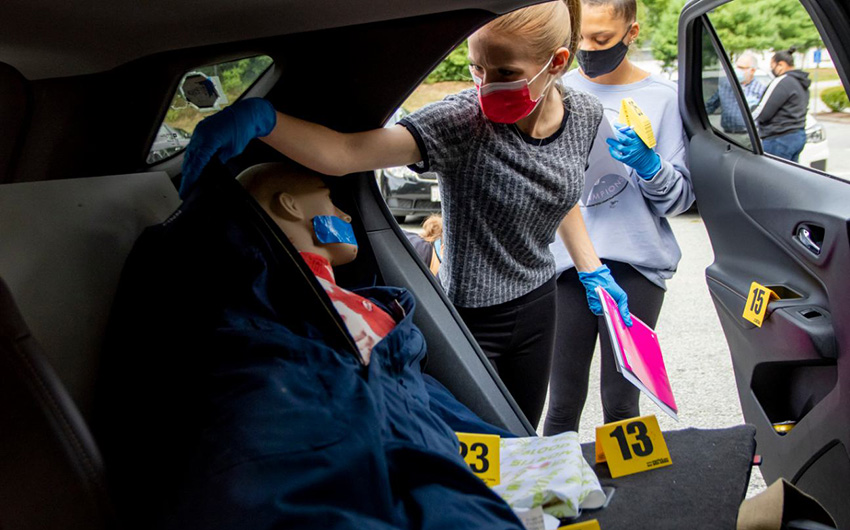
TOPICS:
This year during the COVID-19 pandemic, many science instructors around the world have had to forgo some of their hands-on practical skill development exercises in the lab. Not true for one Forensic Science instructor at Curry College.
Assistant Professor of Science and Math James (Jim) Jabbour continues to provide industry-standard experiences in the classroom. "I have found the majority of my students enjoy learning by a hands-on method and approach," he says. "I provide in-class presentations, and these presentations are then enhanced by hands-on lab activities, which re-enforce the information and ideas I am expecting them to develop."
In Dr. Jabbour's Forensics I course, students have the opportunity to analyze and document evidence from a mock crime scene right on campus in the state-of-the-art Forensic Science Lab. They work together with their peers to solve the case, simulating a real-world experience in the criminal justice field. “I do not teach directly from a text without it bring accompanied by professional experiences, examples, activities, and scenarios," he says.
For Forensics Science major Hailey Gonsalves '23, Jabbour's class provides an unmatched learning experience that is essential for her transition to the industry. "I love this course because it develops our observation and teamwork skills with hands-on learning. We're always doing something interactive, whether it's processing evidence or investigating a mock crime scene. And I just love how it still feels normal with everything going on right now."
While extensive classroom and lab safety precautions and restrictions are implemented throughout campus this fall due to the pandemic, science students are far ahead of the curve, already trained to operate with robust hygiene in their lab courses. "We're taught to sanitize our areas and to get in the practice of putting on gloves every time you enter the lab as standard practice," says Gonsalves. Compliant with social distancing guidelines, the indoor lab space was recreated with nine work stations, which are occupied by a single student and set six feet apart, while field work is conducted outdoors when weather permits.
The interactive education within the Forensic Science program develops students' ability to analyze different situations, setting them up for success in a variety of career paths. The interdisciplinary program blends sciences with curriculum from criminal justice and psychology, and prepares graduates for positions working as crime science or lab technicians, as well as in specialized areas including crime scene investigations, forensic DNA, forensic chemistry, trace evidence, firearms examination, fingerprints, arson, and drug analysis.